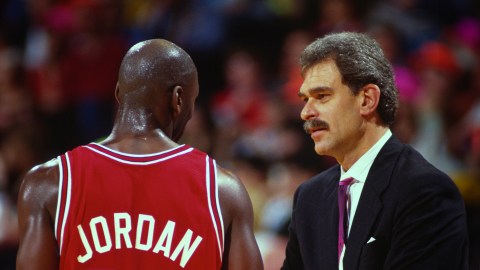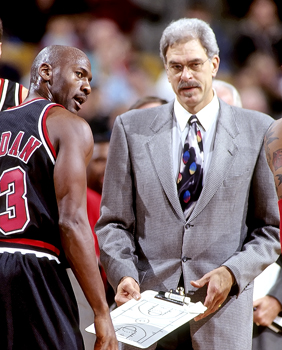The manager’s playbook for fielding a high-impact team

- While the business world tends to celebrate successful leaders, no leader can achieve success without a team of “impact players.”
- An impact player is someone who brings exceptional value while also demonstrating a need to challenge themselves.
- To build such a team, give people permission to be courageous, and recognize that everyone has the capacity to make a difference.
In the 1990s, the Chicago Bulls forged a dynasty. Led by coach Phil Jackson, the Bulls won six NBA championships between 1991 and 1998. The superstar of the Bulls lineup was, of course, Michael Jordan. To this day, Jordan holds the record for career regular season and playoff scoring averages and is widely considered the greatest basketball player of all time. (Though, LeBron James fans can certainly argue that last point.)
But it wasn’t only Jordan’s dynasty. Jackson led an entire team of impactful players who contributed to the Bulls’s prowess. There was Scottie Pippen, another all-time great. Dennis Rodman improved the team’s defense, while players such as John Paxson, Horace Grant, and Bill Cartwright all contributed important plays in clutch moments.
“The workplace has impact players as well,” Liz Wiseman, executive advisor and author of Impact Players, tells Big Think+ in an interview. “[These are] the people we turn to in the high-stakes situation. The people we hand the ball to in the moments that matter and know are going to get the job done, but they’re going to do it in a way that secures a win for the whole team.”
Unfortunately, the business world tends to focus on leaders rather than teams. Steve Jobs, Jack Welch, Jeff Bezos, and Mark Zuckerberg have had more praise sung about their careers than most saints. Yet, without a team of dedicated and talented individuals, they never could have achieved the successes they did.
Want to field your own team of high-impact players? Wiseman can help you start building your playbook.

What is an impact player?
Plenty of team members do solid work. They show up on time, they complete their tasks, and everything is done at an acceptable level of quality. Bonus if they bring a dynamite casserole to the semiannual office potluck.
While there’s nothing wrong with that, an impact player rises above solid, good, or even great to reach the level of exceptional.
In her interview, Wiseman lists several qualities that impact players exemplify. These include rising to the occasion when stakes are high, leading regardless of their role, and working seamlessly with others. They also contribute beyond the job description and approach their work with an understanding of the value it will bring to the organization.
That description doesn’t comprise the totality of an impact player. There are probably as many ways to make a difference as there are roles. But it does offer a hint of what separates these team members from ordinary contributors: mindset.
As Wiseman puts it: “Becoming an impact player isn’t just about changing our behavior, it’s about changing the beliefs that drive our behavior. […] It’s about telling ourselves that I could do something about this, that I have the power to do something about that, that someone would want me to do something about this.”
Building a team of impact players
It’s a nice bit of luck when a superstar joins your team. But as a manager, if you don’t know how to capitalize and cultivate such talent, it won’t lead you to success by default.
In fact, over-relying on talented individuals can have the opposite effect. It can lead to frustration for the superstar when their efforts don’t produce, frustration for other team members when they are sidelined, and frustration for you when your plans don’t come together. That’s a lot of ill-feelings all around.
The solution then is to build a team of impact players and cultivate their skills as well as their ability to use those skills collaboratively to create even more value. Wiseman recommends these four steps to start:
1. Be a high-impact coach
Star athletes won’t play for just anyone. They want a coach who helps them create the best version of themselves. For Michael Jordan and the Bulls, that coach was Phil Jackson. For Tom Brady and the New England Patriots, it was Bill Belichick. And for every Manchester United player between 1986 and 2013, it was Sir Alex Ferguson.
What sets impact coaches — and, by extension, managers — apart is their ability to create environments that push people while also allowing them the freedom to try their hands at meaningful plays. They don’t worry whether those plays will make them more influential. Instead, they aim to support their players and help them succeed at the highest level.
A word of warning: Don’t misconstrue winning to be the same as impactful. Coach Bob Bowman may have led Michael Phelps to unprecedented success as an Olympic athlete, but his aggressive, belittling coaching style caused Phelps to burn out and retire.
Thankfully, Bowman learned his lesson. Today, a no-less-successful but infinitely calmer Bowman has cultivated teams of impact players as the head coach at Arizona State.
2. Seek out the impact mindset
Skills are important, but an impact player isn’t defined by their resume. As mentioned above, a certain mindset is necessary to put those skills to the test.
Wiseman says you’ll recognize this mindset because the team member will have a desire to learn and grow. After all, if they are fine being comfortable, then what reason will they have to rise to any occasion? Impact players will also have a strong sense of agency and believe that they can tackle difficult problems but not feel the need to control others in the process.
Finally, they should be able to handle ambiguity since challenges tend to lie at the messy fringes of what we already know how to do.

3. Go easy on failure
As a leader, if you create an environment where failure isn’t an option, then even impact players will hide in the safety of the familiar. To push impact players to succeed, Wiseman says you need to provide permission to be courageous.
“What we find is that for impact players to show up and play big, they’re not working harder. They’re working in more courageous ways,” she notes.
To do that, you need to cultivate psychological and intellectual safety for your team. Your team should feel they can adapt, learn, experiment, and speak up without fear of reprisal or censure. Praise effort, don’t bemoan failure, and be sure to communicate this clearly and often. Only then can you expect your team to impact in what Wiseman calls “an environment of stretch.”
“[In an environment of stretch], people are expected to go do what needs to be done, rather than hide out in the comfort of their job description or boundaries,” Wiseman adds. “Create the kind of stretch where people feel like they’re obligated to stay with the problem.”
4. Realize that everyone can make an impact
Not every player can rise to the level of a superstar. But just because everyone can’t have Air Jordan-caliber impact in their field, office, or occupation doesn’t mean that they can’t make a meaningful difference.
As such, team leaders need to start with the assumption that everyone can be an impactful team member. That means providing the support and training necessary to hone their team members’ skills, as well as allowing them to show what they can do.
The Bulls dynasty is a perfect example. While Michael mania may have outshined others’ contributions, it’s worth remembering that he lost many games early in his career despite incredible skill. To borrow a phrase from teammate Pippen, Jordan could be more focused on scoring than winning. It was only when Phil Jackson put together a team of impact players who could play with Jordan that the Bulls began their historic ascent.
“Don’t just identify the impact players on your team. Lead your team with the assumption that everyone, at any level, at any position, can play with impact. Everyone can play big,” Wiseman advises. “When you do that, you build a team where everyone’s thinking and operating like an impact player. Everyone’s a difference-maker, not a position-holder.”





